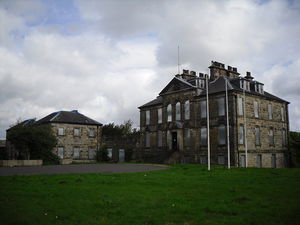Annotation:Cumbernauld House: Difference between revisions
Alan Snyder (talk | contribs) (fix citation) |
Alan Snyder (talk | contribs) mNo edit summary |
||
| Line 21: | Line 21: | ||
Oswald ('''Caledonian Pocket Companion, vol. 2'''), 1760; p. 32. | Oswald ('''Caledonian Pocket Companion, vol. 2'''), 1760; p. 32. | ||
Ritson ('''Scottish Songs, vol. 1'''), 1794; No. 19, pp. 39–40. | Ritson ('''Scottish Songs, vol. 1'''), 1794; No. 19, pp. 39–40. | ||
Ritson ('''Scottish Songs, vol. 1'''), 1869; No. 19, | Ritson ('''Scottish Songs, vol. 1'''), 1869; No. 19, p. 145. | ||
<br> | <br> | ||
<br> | <br> | ||
Revision as of 04:24, 21 April 2020
Back to Cumbernauld House
CUMBERNAULD HOUSE. AKA – "Cumberland House," "Cumernad House." Scottish, Air (4/4 time). G Major. Standard tuning (fiddle). AABB. Cumbernauld House [1] is a fine example of neo-classical architecture designed by fashionable architect William Adam and built for the Fleming family. It was completed in 1731. The last Lord Fleming, Earl of Wigton, died childless in 1747 and the estates passed to the Elphinstone family. Charles Elphinstone-Fleming, a retired Admiral, was laird from 1799–1840, and was for a time MP for Stirlingshire.

Source for notated version:
Printed sources:
Huntington (William Litten's Fiddle Tunes, 1800–1802), 1977; p. 26.
Johnson (Scots Musical Museum, vol. 2); No. 142, p. 149.
McGibbon (Collection of Scots Tunes, vol. 3), 1762; p. 70.
Napier (Scots Songs, vol. 3), 1794; p. 48.
O'Farrell (Pocket Companion, vol. 3), c. 1808; p. 13.
Oswald (Caledonian Pocket Companion, vol. 2), 1760; p. 32.
Ritson (Scottish Songs, vol. 1), 1794; No. 19, pp. 39–40.
Ritson (Scottish Songs, vol. 1), 1869; No. 19, p. 145.
Recorded sources:
